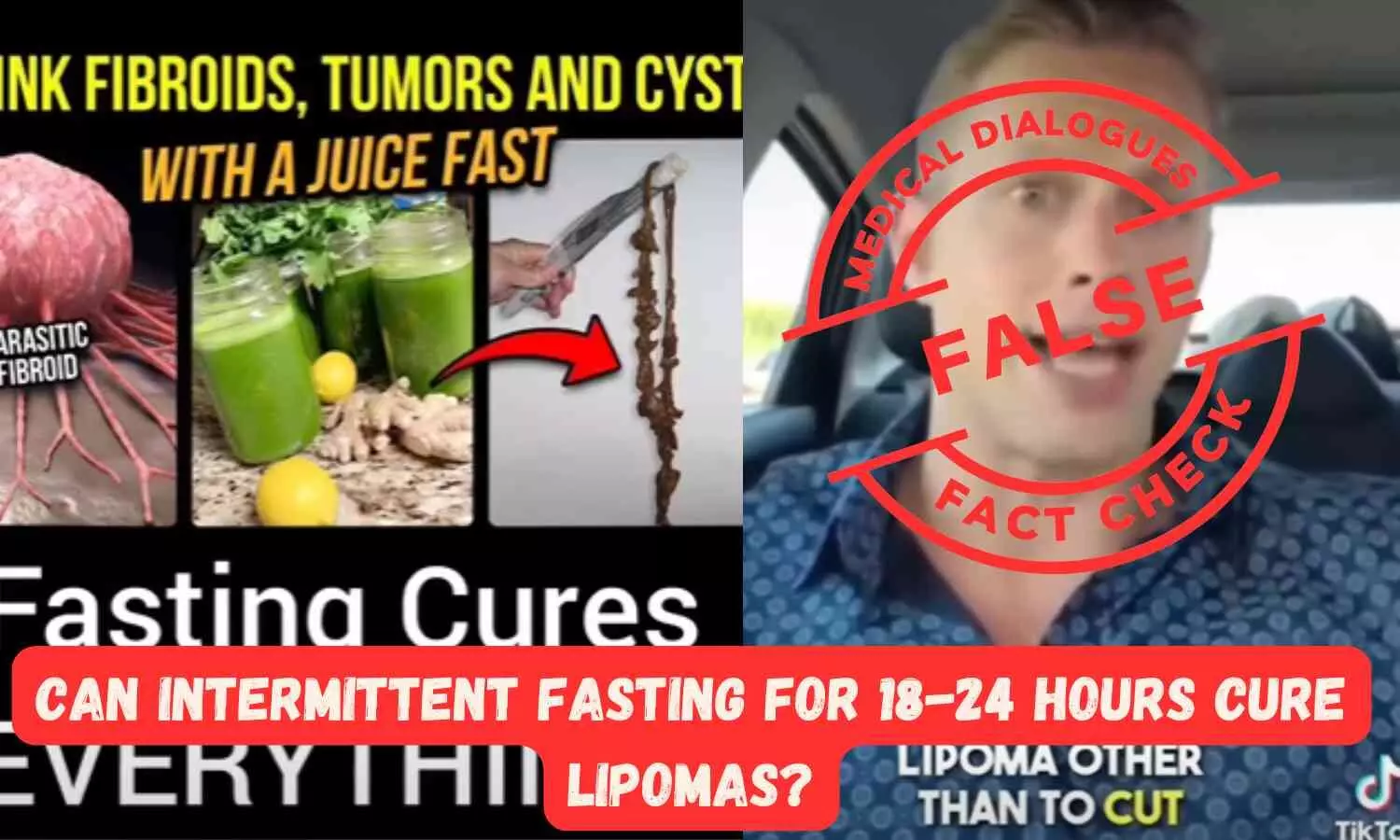Fact Check: Can Intermittent fasting for 18-24 hours cure lipomas?

A reel posted on Facebook claims that Intermittent fasting for 18-24 hours cures lipomas. The user's claim is False.
Claim
A Facebook reel claims intermittent fasting for 18-24 hours cures lipomas. Yesu Kristo on Facebook claims that he has dealt with lipomas for 10 year. He goes on to say that lipomas are non-cancerous fatty tumors in the body, and they were all over his body, from his stomach down to his legs. He states that he had some lipomas cut out of his back, and they were almost as big as a golf ball. After consulting five doctors in the U.S., all of them told him that the only way to remove these lipomas was through surgery. However, he argues that they were wrong, claiming that doctors are indoctrinated to diagnose and treat, not to prevent and heal.
He goes on to claim that people have the power to heal themselves, generalizing the claim that the lipomas disappear through intermittent fasting for 18 to 25 hours a day and that fasting cures everything. A picture then appears on the video that states The post has 10.1K likes and can be accessed here.
Fact Check
The claim made by the user is False.
What are lipomas?
Lipomas are common, non-cancerous tumors made up of fat cells, often surrounded by a thin fibrous capsule. They typically occur in the subcutaneous tissues of the head, neck, shoulders, and back, but can also be found in other areas like the thighs. Most lipomas grow slowly and do not require treatment unless they cause discomfort or multiply. While generally harmless, lipomas can be linked to rare conditions such as multiple hereditary lipomatosis and Gardner syndrome. Several uncommon types of lipomas include angiolipoma, myolipoma, and hibernoma.
Dr Suchismitha Rajamanya, Lead Consultant & HOD - Internal Medicine, Aster Whitefield Hospital, Bengaluru explained, "Lipoma are benign tumors made of fat, occurring in the subcutaneous tissue. Risk factors include a positive family history, obesity and lack of exercise. Subcutaneous lipomas are rarely serious. However, lipoma occurring in the internal organs like the GIT, can lead to issues like ulceration and obstruction. Very rarely, malignant transformation can occur to liposarcomas."
What is intermittent fasting?
Intermittent fasting involves abstaining from or significantly reducing food intake for specific periods. It is widely promoted for weight loss, improved cardiovascular health, diabetes management, and longevity. The most common methods include fasting on alternate days or restricting eating to certain windows of time each day. In intermittent fasting, the "eating window" refers to the specific time frame during which food can be consumed while fasting is observed for the remainder of the day. Common approaches include the 16:8 method, where one fasts for 16 hours and eat within an 8-hour window, or the 5:2 method, where normal eating occurs for 5 days a week, followed by 2 days of significantly reduced calorie intake. During the eating window, meals are generally unrestricted, though focusing on nutrient-dense foods is recommended to optimize the potential health benefits of intermittent fasting. This controlled eating pattern helps regulate insulin levels and supports the metabolic switch from glucose to fat burning, aiding weight management and overall health.
Can Intermittent fasting for 18-24 hours cure lipomas?
Intermittent fasting can offer health benefits. It may also aid in tumor therapy and cancer treatment.
An article published in Nutrients found that intermittent fasting has demonstrated positive effects on weight loss, reduced insulin resistance, and improved levels of hormones like leptin and adiponectin. Both pre-clinical and clinical studies indicate that intermittent fasting offers a wide range of benefits for conditions such as obesity, type 2 diabetes, hypertension, and cardiovascular risk factors.
In Xu Zhao et. al.'s study, intermittent fasting was identified as a potentially promising approach in clinical tumor therapy. However, it also presents challenges, as it can impact tumor growth, boost immune responses, and alter the energy metabolism in cancer patients.
A study by Sagun Tiwari et. al. suggests that intermittent fasting, when done under medical supervision and integrated with standard cancer treatments, may be beneficial for cancer patients. However, it emphasizes that fasting should not be recommended for malnourished or frail individuals, and further research is needed to establish its long-term effects.
Another review published in the European Journal of Clinical Medicine highlights intermittent fasting as a potential cancer prevention and treatment strategy by targeting metabolic, immune, and cellular processes to slow cancer progression and improve treatment outcomes. However, due to cancer's complexity and varied patient responses, further research is needed to establish clear guidelines for its use in oncology.
Fasting has to be done carefully also as it may have some side effects. A retrospective cross-sectional study published in Cureus found that the side effects of intermittent fasting for long hours included headaches, lethargy, mood swings, dizziness, and polyuria.
The NIH further noted that individuals who regularly fast for more than 16 to 18 hours a day can have an increased risk of developing gallstones, potentially leading to the need for gallbladder removal surgery.
Despite various benefits of intermittent fasting, no scientific evidence supports the claim that fasting for 18-24 hours cures lipomas.
Responding to the claim Dr. Archit Pandit, Director & HOD, Surgical Oncology, SHALBY Sanar International Hospitals, Gurugram said "Lipomas are non-cancerous fatty tumors. A tumor doesn't always mean cancer, they can be either they can be benign tumors which are non-cancerous, or cancerous tumors. Lipomas are benign tumors, non-cancerous tumors and are located at the arms, nape of the neck back, tummy and grow in size and they don't do anything. This is a big myth that Intermittent fasting for 18-24 hours cures lipomas. Lipomas occur in all age groups, fatty patients, slim patients and aren't related to fasting. these are just fatty nodules that remain as lumps and don't grow anywhere. The only indication for the removal of lipomas is if they grow in size; otherwise, they stay in the body and cause no harm. Lipomas if required to be removed, can be removed through surgical procedures or liposuction."
Dr. Suchismitha Rajamanya, Lead Consultant & HOD - Internal Medicine, Aster Whitefield Hospital, Bengaluru added, "Intermittent fasting is a kind of duet wherein an individual alternates between periods of fasting and free eating for a particular time. In this diet, the body uses ketone body as the source of energy during fasting which results in DNA repair and antioxidant defense. Long-term effects of intermittent fasting include improved insulin sensitivity and reduced abdominal fat and inflammation. Studies in animals have shown that it reduces the occurrence of spontaneously occurring tumors and lymphoma. It is thought to impair metabolism in cancer cells, inhibiting their growth. However, there have not been any studies showing a decrease in lipoma in humans with intermittent fasting."
Medical Dialogues Final Take
Intermittent fasting has shown health benefits such as weight loss, reduced insulin resistance, and improved hormone levels. It has also been identified as a potentially promising approach as an adjunct in tumor therapy and cancer treatment where more research is being directed. However, no scientific evidence or medical consensus supports the claim that Intermittent fasting for 18-24 hours cures lipomas.
Hence, the claim is FALSE.



